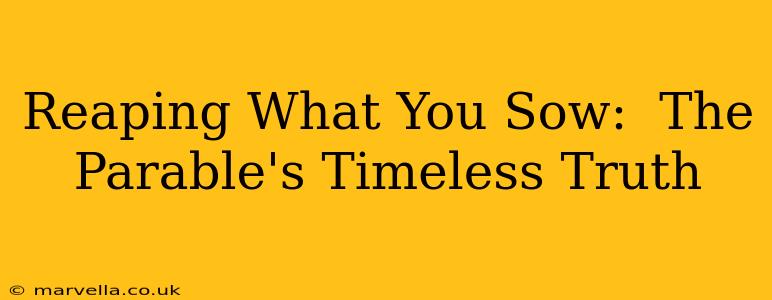The parable of reaping what you sow, a cornerstone of many faiths and philosophies, resonates deeply across cultures and time. It's a simple yet profound concept: your actions have consequences, and the nature of those consequences reflects the nature of your actions. But understanding this parable goes beyond a simplistic cause-and-effect relationship; it delves into the intricacies of karma, personal responsibility, and the long-term impact of our choices. This exploration will unveil the timeless wisdom embedded within this age-old saying.
What Does "Reaping What You Sow" Actually Mean?
At its core, "reaping what you sow" signifies the principle of karmic retribution. It's not about divine punishment or cosmic vengeance, but rather a natural consequence of our actions. If you plant seeds of kindness, you're likely to harvest a bountiful crop of positive relationships and experiences. Conversely, sowing seeds of negativity, such as anger, deceit, or selfishness, will likely yield a harvest of discord, betrayal, and unhappiness. This isn't a rigid, deterministic law, but a general principle highlighting the interconnectedness of cause and effect.
Is It Just About Actions, or Are Intentions Important Too?
This is a crucial question. While the consequences of our actions are undeniably significant, the parable also implicitly addresses the importance of intention. An unintentional act, while potentially causing harm, carries a different weight than a deliberate and malicious one. The parable suggests a nuanced understanding of responsibility, acknowledging that both the act itself and the motivation behind it contribute to the eventual harvest. A truly virtuous life strives for both righteous actions and pure intentions.
How Does This Parable Apply to Different Aspects of Life?
The principle of reaping what you sow permeates various facets of life:
-
Relationships: Investing time and effort in nurturing healthy relationships yields strong bonds and mutual support. Conversely, neglecting or mistreating others often results in strained connections and isolation.
-
Career: Hard work, dedication, and integrity often lead to professional success and fulfillment. Conversely, laziness, dishonesty, and unethical behavior can lead to setbacks and professional ruin.
-
Personal Growth: Consistent self-improvement, learning, and positive self-talk cultivate inner peace and confidence. Neglecting personal growth can result in stagnation and self-doubt.
-
Financial Well-being: Responsible financial habits, such as saving and investing wisely, generally lead to financial security. Impulsive spending and poor financial management often lead to debt and hardship.
What are the Different Interpretations of this Parable?
Different religions and philosophies offer nuanced interpretations of the parable. Some emphasize the immediate consequences of actions, while others focus on the long-term repercussions. Some interpretations highlight the importance of repentance and redemption, suggesting that even after sowing negative seeds, it's possible to cultivate a more positive future through conscious effort and amends.
Does "Reaping What You Sow" Mean Everything is Predetermined?
No, the parable doesn't suggest a rigid, predetermined fate. It emphasizes personal responsibility and the power of choice. We are not passive recipients of fate, but active participants in shaping our own destinies through our actions and decisions. The principle offers a framework for understanding cause and effect, not a prediction of an inevitable outcome. We have the agency to choose the seeds we plant and, to a significant degree, the harvest we reap.
Conclusion: A Guide to Conscious Living
The parable of reaping what you sow isn't merely a moral lesson; it's a powerful framework for navigating life consciously. By understanding the interconnectedness of our actions and their consequences, we can cultivate a more fulfilling and meaningful existence. It encourages us to strive for positive actions, cultivate virtuous intentions, and take responsibility for the harvest we create in all areas of our lives. It is a timeless reminder that the seeds we plant today will determine the future we harvest tomorrow.

